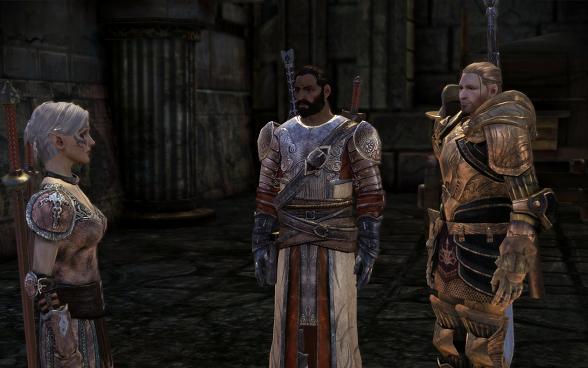This post has not been edited by the GamesBeat staff. Opinions by GamesBeat community writers do not necessarily reflect those of the staff.
I loved Dragon Age, but one thing kept nagging at me throughout my Grey Warden’s journey. Something I couldn’t quite place. That was until Mass Effect 2….
Sure, I suppose my first warrior — who resembled an anorexic David Hasselhoff — was structured so I could project myself onto him, but something was off. There was a disconnect and it wasn’t due to his dapper hair.
It took Mass Effect 2 enrapturing any spare moment of my existence to make me realize what was wrong with the Warden. It became so clear.
The Grey Warden was a voiceless puppet lacking any kind of inner substance to connect with. He had no resonance in the story other than his Grey Warden label (Warden to his friends). As a result, the player must fill in the blanks.

My name is Syndrosa Lanfear II, daughter of Cyrion Tabris and Adaia the Rogue, but you guys can call me… Warden.
When I came back to my Shepard from a long hiatus, the connection was immediate. I projected myself effortlessly, and forgot that I was a person playing a video game. Here was a role I had built.
I was Commander Shepard: his decisions were my decisions and if anyone tried to step-up, I’d paragon-slap them in the face.
With the Warden, you rarely experience your hero. The majority of dialogue angles are shot from the back of your character’s shoulder – ridiculous if you happen to wear heavy plate. Facial reactions are rare and the poignant moments are often subverted by your characters blank stare or side-long glance to the person directly at your side.
This is worsened by the caliber of party members you’re surrounded with in Dragon Age. Each one is unique and carries with them a rich history within the world. Yet you’re often slack-jawed and incapable of inspired speech even if they lit your foot on fire and forced you to marry a Genlock.
On the flip, Shepard is a commander in motion. You sense it’s more than just a title because of his actions and how those around him respond. Whether you make Shepard a jerk, or a nice-guy, he resonates as your conduit in the Mass Effect mythos. Why? It’s simple.
He’s got stuff going on underneath. Call it gumption or spacer confidence; he’s wrestling with conflicts and we as gamers form a symbiotic relationship with this. It’s far easier to assume a role that isn’t completely blank and vacant.
After I emerged from Mass Effect 2, I eventually re-launched myself back into Mass Effect 1 and then followed that with a few more runs through Dragon Age, enjoying myself very much.
This realization was hard because I love Dragon Age. The world is just as rich as Mass Effect’s and the main story thread is something you can really sink into.
But even in the first Mass Effect, Shepard’s superiority to the Grey Warden as your hero is immediately apparent. He’s kind-hearted. He’s racist toward Turians. He’s whatever role you want to play within the restricted narrative. And this brings me to the crux of the matter.
In BioWare’s attempt to open up the narrative with Dragon Age, they end up removing the one thing that defines a great protagonist: a strong identity.
[embed:http://www.youtube.com/watch?v=pm3s7GKlXUQ ]
You can mold Shepard because they give you a starting block of ingredients. They give you a defined role. You can mold the Warden, but it takes longer, requires more mental gymnastics and will always fall short.
Both games are great in their own right. I just hope when Dragon Age 2 emerges BioWare finds a way to compensate for this unfortunate disparity.
